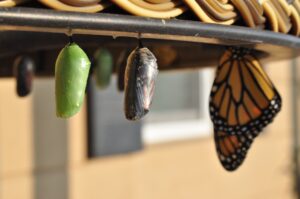I’ve learned that grit theory changes the game in personal growth. It’s not just about being talented or lucky. Grit, a blend of passion and persistence, can help you succeed in life’s hurdles. Angela Duckworth, a leading researcher, found that grit often beats natural talent1.
Grit isn’t set in stone. It grows as we tackle and beat challenges. This mindset is key. It turns failures into chances to grow. The best part? We can develop grit at any point in our lives1.
Interestingly, grit tends to grow with age and experience. This means our ability to persevere can get better over time1. Duckworth’s work shows that grit is both a trait and a skill we can build12.
To measure grit, Duckworth created the Grit Scale. It’s a quiz that looks at our ability to keep going over time2. Her studies in Chicago schools showed that students with more grit were more likely to finish school2.
Key Takeaways
- Grit combines passion and perseverance for long-term goals
- It’s a stronger predictor of success than talent alone
- Grit can be developed and improved over time
- The Grit Scale measures one’s level of perseverance
- Mistakes are viewed as learning opportunities in grit theory
- Grit is valuable in both personal and professional settings
- Developing grit involves interest, practice, purpose, and hope
Understanding Grit: The Foundation of Perseverance
Grit theory is a key idea in personal growth. It mixes passion and perseverance for lasting success. This method focuses on hard work and bouncing back, not just talent.
Defining Grit: Passion and Perseverance
Grit means keeping up passion and effort towards big goals. It’s about sticking to your goals, even when it’s hard. Studies show grit is a stronger sign of success than IQ or talent3.
The Origins of Grit Theory
Angela Duckworth’s work started the grit theory. Her studies say grit is as important as smarts for doing well3. Now, this idea helps in education, sports, and career growth.
Key Components of Grit
The key parts of grit are:
- Passion for long-term goals
- Perseverance in facing challenges
- Resilience against setbacks
- Consistent effort over time
- Self-discipline in pursuing goals
People with grit set clear goals, ask for feedback, and get back up after falls4. They believe they can change and get better4.
| Grit Component | Description | Impact |
|---|---|---|
| Consistency of Interests (Passion) | Maintaining focus on long-term goals | Boosts motivation and career dreams5 |
| Perseverance of Effort (Diligence) | Keeping up effort despite obstacles | Shows strong link to good school results5 |
| Resilience | Ability to get over hard times | Lowers stress and sadness5 |
The Grit Scale goes from 1 to 5, showing how gritty you are. Higher scores mean you’re more gritty and successful in many areas5. By learning and building grit, we can reach our big goals and beat challenges.
The Science Behind Grit Theory for Personal Development
Grit theory has become a big deal in understanding success. It’s about sticking to your goals with passion and hard work6. This skill is key for growing as a person and doing well in school.
Research shows grit makes a big difference. In school, it helps students do better and stay in school longer76. This means grit is important for success.
Grit isn’t just for school. It also helps people stick with things in the military, at work, and in marriage6. This shows grit is useful in many areas of life.
“Passion and perseverance for long-term goals are essential ingredients for outstanding achievement.”
But, not all studies agree on grit’s effects. Some haven’t found the same results as earlier research7. This means we need more studies to understand grit better.
| Area | Impact of Grit |
|---|---|
| Education | Improved academic performance and retention |
| Work | Enhanced job performance and career success |
| Personal Life | Greater life satisfaction and goal achievement |
Looking into grit, we see it’s a big deal for personal growth and success. By learning and using grit, people can better chase their goals and face challenges in life.
Grit vs. Talent: Debunking Common Misconceptions
In the world of personal development, a debate rages on: Is success born from innate talent or cultivated through effort? Let’s explore this question and challenge some widespread beliefs about achievement.
The Role of Effort in Achievement
Many believe that natural talent is the key to success. Yet, research paints a different picture. Dr. Walter Mischel’s famous marshmallow experiment showed that kids who could delay gratification went on to have better careers and overall life quality8. This ability to persist, a core component of grit, plays a crucial role in long-term achievement.
Grit as a Predictor of Success
Grit has gained significant attention in recent years. Angela Duckworth’s TED Talk on the subject has been viewed over 8.4 million times, highlighting its widespread appeal9. While IQ accounts for about 40% of variance in test scores, grit adds an extra layer to our understanding of success factors.
Overcoming the “Natural Talent” Myth
The idea that talent alone leads to success is misleading. Grit, defined as passion combined with perseverance, is essential for overcoming adversity and achieving important goals10. This challenges the notion that we’re limited by our innate abilities. Instead, it emphasizes that effort and talent development are key drivers of achievement.
| Factor | Impact on Success |
|---|---|
| Natural Talent | Limited influence |
| Grit (Passion + Perseverance) | Significant impact |
| Effort | Crucial for achievement |
| Talent Development | Essential for growth |
By embracing grit and focusing on continuous improvement, we can unlock our potential and achieve remarkable success. Remember, it’s not just about talent – it’s about the persistent effort we put into developing our skills and pursuing our passions.
Cultivating Grit: Strategies for Building Tenacity
Building grit means growing a mindset that believes you can get better. It’s also about setting goals that are hard but doable. Angela Duckworth’s TED Talk in 2013 made people really take notice of grit as a key to success11.
To grow grit, set goals for yourself every day. Break big goals into smaller tasks. This keeps you focused and motivated, even when things get tough.
Teachers are now teaching grit in the classroom. Amy Lyon, a teacher from New Hampshire, uses the “grit pie” to teach students about being optimistic and responsible11. This fun activity helps kids learn to be resilient and keep going.
“The Hard Thing Rule” is a powerful tool for teaching grit. It means working hard and getting better at tough tasks.
Seeing people who are really gritty can inspire us. Stories of people like Michael Jordan show us how to keep going after failure11. Reading stories like “The Little Engine That Could” can also teach kids to be grittier11.
| Grit-Building Strategy | Description | Benefit |
|---|---|---|
| Growth Mindset Cultivation | Embrace challenges as opportunities for growth | Increased resilience and adaptability |
| Goal-Setting Techniques | Set challenging but achievable objectives | Improved focus and motivation |
| Deliberate Practice | Engage in focused, purposeful training | Enhanced skill development and mastery |
| Resilience Training | Learn to bounce back from setbacks | Increased perseverance and mental toughness |
Using these strategies can really change your life for the better. By sticking with them, I’ve seen big changes in myself and others. We all get better at being gritty and tough.
Grit in Education: Fostering Resilience in Students
Grit is key to building student resilience and boosting academic success. In education, grit means sticking to goals with determination and passion12. It’s become more important as we see how it helps students do well.
Grit’s Impact on Academic Performance
Studies show grit is a strong sign of doing well in school. Students with grit do better than others. At West Point Military Academy, grit was a better predictor of success than other factors12.
Grit also links to better grades, staying in school longer, and doing well in jobs13. This shows why teaching grit is vital for students to succeed.
Implementing Grit-Based Teaching Methods
Teachers can teach grit to help students bounce back from tough times. They focus on sticking to goals, setting them, and getting past obstacles. Teaching students that their abilities can change helps a lot too.
Research shows grit and thinking you can grow your abilities use different parts of the brain13. Using both in teaching can help students grow more fully.
Long-Term Benefits of Grit in Education
Teaching grit has big long-term benefits. It helps students stay committed, engaged, and more likely to graduate14. It helps them keep going and stay focused on their goals.
People with grit do better than those just relying on talent12. Adding grit to education prepares students for the future and encourages learning for life.
| Aspect | Impact of Grit |
|---|---|
| Academic Performance | Predicts higher report card grades and educational attainment |
| Student Resilience | Enhances ability to overcome challenges and setbacks |
| Long-term Success | Contributes to better job performance and career advancement |
Applying Grit Theory in Professional Settings
Grit theory has changed how we see career growth and bouncing back at work. I’ve seen it help people grow in many fields. It says that being passionate and persistent is more important than just being naturally good at something15.
Now, companies know how important grit is for success. Research shows that grit helps people do well in different areas, like the military or spelling bees15. So, companies are now focusing more on building grit in their teams.
To check how gritty someone is, a ten-question scale is used. This scale looks at how much someone stays persistent and loves their work15. Knowing your grit score helps you see where you need to get better and set goals for your career.
“Grit is the ultimate predictor of success in challenging work environments.”
The key parts of grit are perseverance, resilience, courage, passion, and being careful15. People who have these qualities do well in their jobs. They keep going even when things get tough and stay focused on their big goals.
To grow your grit, find what you love, keep doing it, and work towards something bigger15. These steps help with career growth, making people look for jobs that mean something to them and keep getting better. Creating a grit-focused culture in companies makes them more resilient and leads to lasting success.
Conclusion: Embracing Grit for Lifelong Success
Grit theory is a strong way to grow and succeed. Angela Duckworth found that grit, or “perseverance and passion for long-term goals,” predicts success better than IQ16. This shows that talent isn’t the only thing that makes you successful.
Grit is about having passion and sticking with it. It means putting in effort, practicing on purpose, and being disciplined every day17. In school, students with grit do better in hard classes and get good grades18. This shows why we should work on having grit in our learning journey.
Grit helps in more than just school. Athletes with grit work hard and entrepreneurs with grit handle business ups and downs well18. By adopting grit, we can better face challenges and adjust to new situations. Remember, building grit takes time and effort, needing us to keep thinking and practicing17.
Let’s work on growing grit in our personal and work lives. By setting big goals, facing challenges, and thinking positively, we can reach our highest potential and find true success1618. Grit is the secret to making our dreams come true.
FAQ
What is grit, and why is it important?
Who developed the concept of grit theory?
How does grit contribute to achievement?
Is grit more important than talent?
How can grit be developed?
How does grit relate to education?
How can organizations apply grit theory?
Source Links
- Why grit is essential for transforming your life and career and how you can develop it – The LEAP Journey – https://leapjourney.org/2018/05/15/why-grit-is-essential-for-transforming-your-life-and-career/
- The Research Behind the TED Talk: Angela Duckworth on Grit – https://digitalpromise.org/2019/03/06/research-behind-ted-talk-angela-duckworth-grit/
- Angela Duckworth and the Research on ‘Grit’ – https://americanradioworks.publicradio.org/features/tomorrows-college/grit/angela-duckworth-grit.html
- Grit: The Power of Passion and Perseverance by Angela Duckworth – https://www.learningandthebrain.com/blog/grit-the-power-of-passion-and-perseverance-by-angela-duckworth/
- The Power of Grit: How to Help Students Achieve Success – https://www.inzpira.com/the-power-of-grit-how-to-help-students-achieve-success/
- Why grit requires perseverance and passion to positively predict performance – https://www.ncbi.nlm.nih.gov/pmc/articles/PMC6176608/
- Growth Mindset and Grit Interventions — The Learning Scientists – https://www.learningscientists.org/blog/2018/4/19-1
- What Marshmallows Can Teach you About Grit – https://www.linkedin.com/pulse/what-marshmallows-can-teach-you-grit-joe-desena
- Don’t Believe the Hype About Grit, Pleads the Scientist Behind the Concept – https://www.thecut.com/2016/05/dont-believe-the-hype-about-grit-pleads-the-scientist-behind-the-concept.html
- Lead With Grit: How Leadership Coaching Can Help You Develop Resilience And Drive – Hone – https://honehq.com/resources/blog/lead-with-grit/
- 9 Activities To Build Grit and Resilience in Children – https://biglifejournal.com/blogs/blog/activities-grit-resilience-children?srsltid=AfmBOor3ONKw4l1mvUu7D5H7jo2WKIlhpxWRENg0B27xOnV7FIOcsk-K
- DocHdl1OnPPMSVRtmpTarget – https://files.eric.ed.gov/fulltext/EJ1081394.pdf
- The development of grit and growth mindset during adolescence – https://www.ncbi.nlm.nih.gov/pmc/articles/PMC8747892/
- Frontiers | The Role of Students’ Self-Regulated Learning, Grit, and Resilience in Second Language Learning – https://www.frontiersin.org/journals/psychology/articles/10.3389/fpsyg.2021.800488/full
- What is Grit? 5 Ways to Develop it Without Burning Out – https://www.betterup.com/blog/to-be-great-grit-isnt-all-that-matters
- Grit, Resilience, and Success: The Psychology Behind Achieving Goals – https://marshallstanton.com/grit-resilience-and-success-the-psychology-behind-achieving-goals-12f50a738d28
- Embracing Grit: The Power of Passion and Perseverance Unleashed. – https://medium.com/@adamsbookshelf/embracing-grit-the-power-of-passion-and-perseverance-unleashed-ad6b51dc4b84
- EssayGenius AI Essay Writer – https://essaygenius.ai/essay/essay-on-grit






